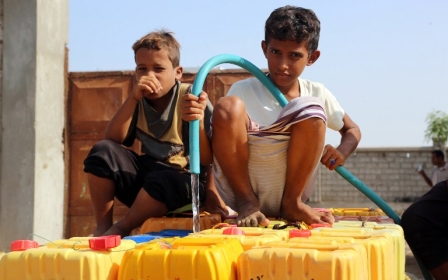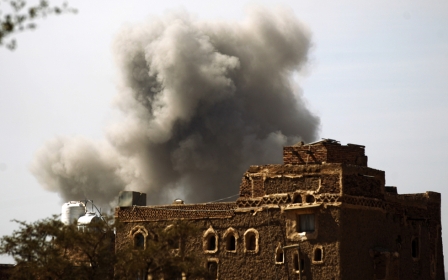Saudi air attacks in Yemen may amount to war crimes, says UN

A UN investigation of 10 air strikes by the Saudi-led coalition in Yemen has concluded that most of the attacks did not involve legitimate military targets and may amount to war crimes, according to a report obtained by AFP on Monday.
A UN panel of experts also said in the report that Yemen's Houthi rebels had tortured and ill-treated detainees in violations that could also amount to war crimes.
The panel investigated 10 air strikes between March and October last year that killed at least 292 civilians, including at least 100 women and children.
"In eight of the 10 investigations, the panel found no evidence that the air strikes had targeted legitimate military objectives," said the report sent to the Security Council on Friday.
"For all 10 investigations, the panel considers it almost certain that the coalition did not meet international humanitarian law requirements of proportionality and precautions in attack."
"The panel considers that some of the attacks may amount to war crimes."
The Saudi-led coalition launched its air campaign in Yemen in March 2015 to support Yemen's president, Abd Rabbuh Hadi, and push back the rebels who seized Sanaa and other parts of the country.
The panel said the violations by the Saudi-led air campaign "are sufficiently widespread to reflect either an ineffective targeting process or a broader policy of attrition against civilian infrastructure".
Warning to allies
About 10,000 civilians have died in the war, according to UN officials, who rank the humanitarian crisis in Yemen as among the world's worst.
The bombing campaign "while devastating to Yemeni infrastructure and civilians, has failed to dent the political will of the Houthi-Saleh alliance to continue the conflict," the report said.
The Houthis are allied with forces loyal to Yemen's former president Ali Abdullah Saleh, who is on a UN sanctions blacklist.
The panel warned that those supporting the coalition may also face UN sanctions.
Led by Saudi Arabia, the coalition includes Bahrain, Kuwait, Qatar and the United Arab Emirates with some support from Egypt, Jordan, Morocco and Sudan.
The United States is offering support to logistical and intelligence activities, but the report said officers from Britain, France and Malaysia were also working at the coalition's Riyadh headquarters.
"All coalition states and their allies also have an obligation to take appropriate measure to ensure respect for international humanitarian law by the coalition," said the experts.
Saudi Arabia has rejected accusations of deliberately targeting civilians in Yemen and charges that Iran is arming the Houthis to expand its influence in the region, a claim denied by Tehran.
The experts said they had "not seen sufficient evidence to confirm any direct large-scale supply of arms" from Iran to the Houthis, but that there were "indications" that Iran-made anti-tank guided weapons were supplied to the rebels.
Stay informed with MEE's newsletters
Sign up to get the latest alerts, insights and analysis, starting with Turkey Unpacked
Middle East Eye delivers independent and unrivalled coverage and analysis of the Middle East, North Africa and beyond. To learn more about republishing this content and the associated fees, please fill out this form. More about MEE can be found here.




